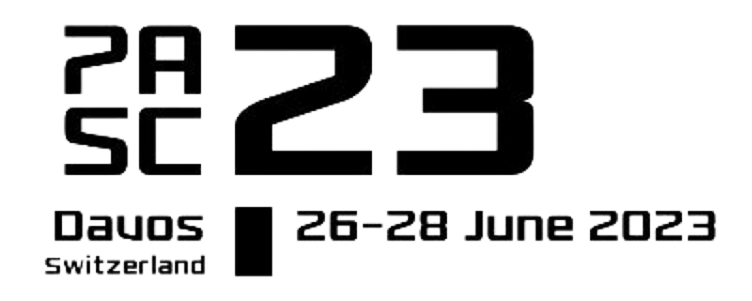About
The PASC Conference series is an international and interdisciplinary platform for the exchange of knowledge in scientific computing and computational science with a strong focus on methods, tools, algorithms, application challenges, and novel techniques in the usage of high performance computing.
The conference was initiated in 2014 by the Platform for Advanced Scientific Computing (PASC) structuring project, which positions Swiss computational sciences in the emerging exascale era. PASC aims at promoting a joint effort to address key scientific issues in various domain sciences through interdisciplinary collaborations between computational scientists, software developers, computing centres and hardware developers within Switzerland.
The Conference is co-sponsored by the Swiss National Supercomputing Centre (CSCS – a unit of ETH Zurich) and the Association for Computing Machinery (ACM). The conference is managed by CSCS.
PASC23 will be held from June 26 to 28, 2023 at the Congress Center Davos, located in Davos, Switzerland.
PASC23
June 26-28, 2023
Congress Center Davos
Davos, Switzerland
pasc23.pasc-conference.org
PASC23 Theme
COMPUTING ACROSS SCALES, DOMAINS, AND COMMUNITIES
Advances at the frontiers of scientific computing increasingly require aggregating and synthesizing previously distinct sources of technique and insight to improve the fidelity, effectiveness, efficiency, and usefulness of scientific results. The theme for PASC23 focuses particularly on advances in aggregating, synthesizing, and transitioning across scales, domains, and communities.
Multi-scale methods, operating on the basis of physics, data, or their hybridization, enable higher fidelity predictive capabilities, especially for complex phenomena with emergent behavior. Aggregating and synthesizing approaches from multiple domains, including techniques from modeling & simulation and data-driven disciplines are essential to improving the quality of our results and their computational feasibility. Integrating activities and teams across distinct communities has also become essential, up to and including expertise in the social and cognitive sciences that can improve how scientific teams develop and use computational tools for research and communicate results to the broader public.
Target Audience
The PASC Conference seeks to engage participants from academia, research labs and industry to address important issues in HPC and computational science. PASC23 is inviting researchers from diverse scientific backgrounds to promote interdisciplinary collaboration and exchange of expertise. The conference is an opportunity for researchers in branches of science that require computer modeling and high-performance simulations to discuss computational techniques and technologies.
Program
The technical program of PASC23 is organized around the following scientific domains:
- Chemistry and Materials (incl. ceramics, metals, and polymers)
- Climate, Weather, and Earth Sciences (incl. solid earth dynamics)
- Computer Science, Machine Learning, and Applied Mathematics
- Applied Social Sciences and Humanities (incl. behavioral, economic, legal, political and business sciences, research software engineering and science, philosophy, languages, and the arts)
- Engineering (incl. CFD, computational mechanics, computational engineering and materials, turbulent flow)
- Life Sciences (incl. biophysics, genomics, bioinformatics, systems biology, neuroscience, and computational biology)
- Physics (incl. astrophysics, cosmology, plasma modelling, and QCD)
The three-day program will include keynote presentations, minisymposia, peer-reviewed papers, panels and poster sessions. The conference is co-sponsored by ACM SIGHPC, and full papers will be published in the ACM Digital Library.

